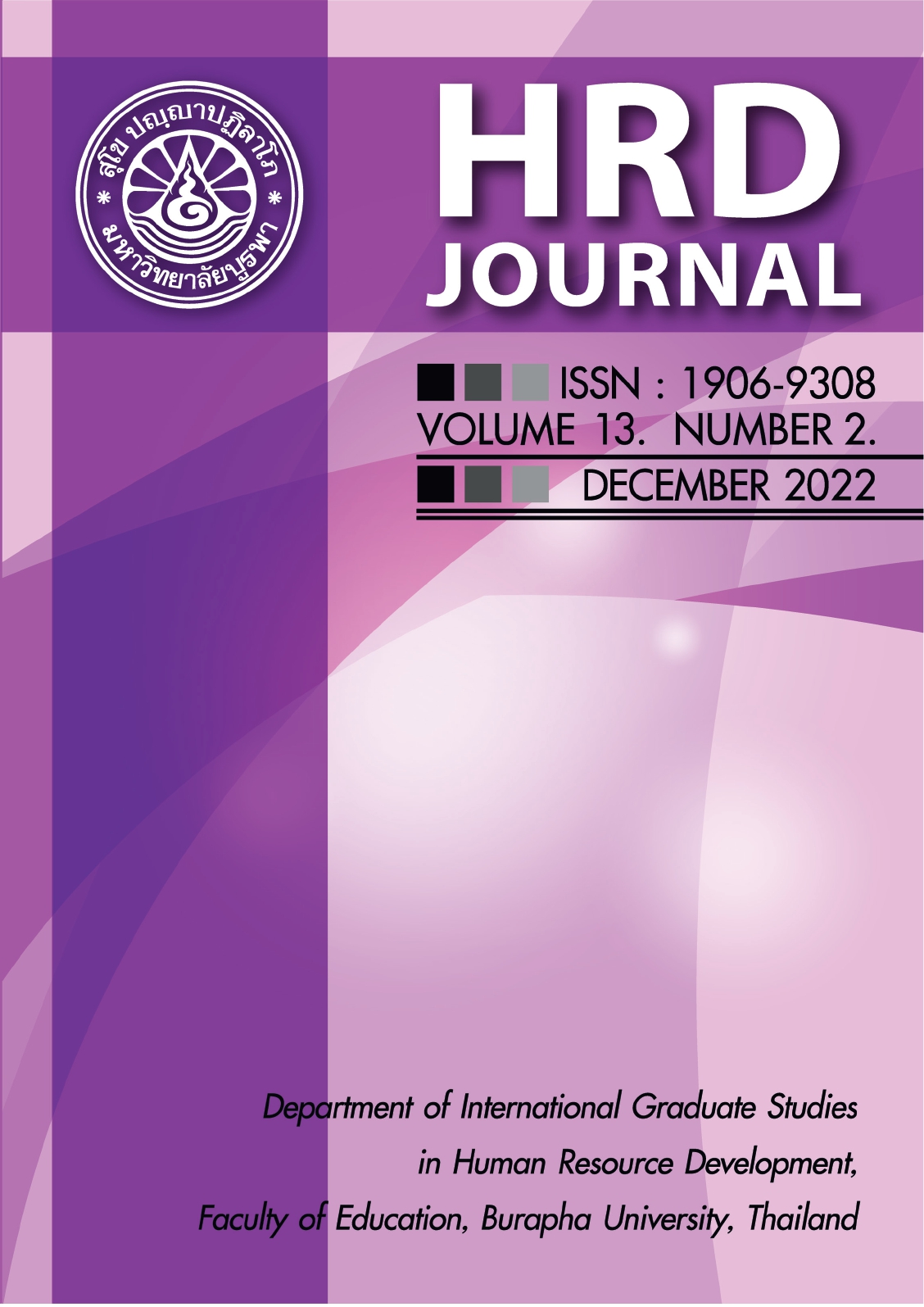Effects of cooperative learning student teams achievement division technique (STAD) with flipped classroom on learning achievement and geo-literacy of mathayomsuksa 1 students
Keywords:
The student teams achievement division, Flipped classroom, Learning achievement, Geography literacyAbstract
The purpose of this research were; 1) study the students’ achievement before and after studying by using cooperative learning STAD technique with flipped classroom. and 2) studying geography literacy of Mathayomsuksa 1 students after studying by using cooperative learning STAD technique with flipped classroom. Disaster Learning Unit. The sample groups in this research consisted of 27 Mathayomsuksa 1 students studying the second semester of academic year 2021 at Bansuanudomvittaya School. The cluster random sampling method was used in selecting students in the experiment group. The research instrument were the lesson plans collaborative learning management, STAD technique with flipped classroom. Disaster Learning Unit achievement test, and the Geography Knowledge assessment form. The data was analyzed by the use of Mean, Percentage, Standard Deviation, and t-test Dependent.
The research results were as follows:
1. Students learning achievement displayed on the post-test scores in the geography subject on the Disaster Learning Unit. Using the STAD cooperative learning management technique with the flipped classroom was significantly higher than the pre-test at the .05 level.
2. The posttest score of geography literacy after using STAD cooperative learning with the flipped classroom. Disaster Learning Unit were at good level.
References
กระทรวงศึกษาธิการ. (2544). การจัดการเรียนรู้แบบร่วมมือ. กรุงเทพฯ: โรงพิมพ์การศาสนา กรมศาสนา.
กระทรวงศึกษาธิการ. (2560). ตัวชี้วัดและสาระการเรียนรู้แกนกลางสาระภูมิศาสตร์ (ฉบับปรับปรุง พ.ศ. 2560) กลุ่มสาระการเรียนรู้สังคมศึกษา ศาสนา และวัฒนธรรม ตามหลักสูตรแกนกลางการศึกษาขั้นพื้นฐาน พุทธศักราช 2551 และแนวการจัดกิจกรรมการเรียนรู้. กรุงเทพฯ: โรงพิมพ์ชุมนุมสหกรณ์การเกษตรแห่งประเทศไทย จํากัด.
กิตติกวินท์ ปินไชย และรัตติกาล สารกอง. (2564). การพัฒนากิจกรรมการเรียนรู้ที่ส่งเสริมการรู้เรื่องภูมิศาสตร์สำหรับนักเรียนชั้นมัธยมศึกษาปีที่ 3. RMU. J., 15(1), 29-42.
กุลิสรา จิตรชญาวณิช. (2562). การจัดการเรียนรู้. กรุงเทพฯ: จุฬาลงกรณ์มหาวิทยาลัย.
เฌอณรินทร์ วรรณรัตนางกูร. (2562). การพัฒนาการรู้เรื่องภูมิศาสตร์ในการเรียนภูมิศาสตร์ทวีปเอเชียของนักเรียนชั้นมัธยมศึกษาปีที่ 1 ด้วยกระบวนการทางภูมิศาสตร์ร่วมกับเทคโนโลยีสารสนเทศภูมิศาสตร์. ปริญญามหาบัณฑิต, สาขาวิชาการสอนสังคมศึกษา, บัณฑิตวิทยาลัย, มหาวิทยาลัยศิลปากร.
ทิศนา แขมมณี. (2562). ศาสตร์การสอน: องค์ความรู้เพื่อการจัดกระบวนการเรียนรู้ที่มีประสิทธิภาพ (พิมพ์ครั้งที่ 23). กรุงเทพฯ: จุฬาลงกรณ์มหาวิทยาลัย.
ปริพันธ์ หมั่นค้า. (2564). การศึกษาผลสัมฤทธิ์ทางการเรียน กระบวนการกลุ่ม และความพึงพอใจในการเรียน เรื่อง ชีวิตในสิ่งแวดล้อม โดยใช้การจัดการเรียนรู้แบบห้องเรียนกลับด้านร่วมกับการเรียนรู้แบร่วมมือของนักเรียนระดับมัธยมศึกษาปีที่ 4. วิทยานิพนธ์การศึกษามหาบัณฑิต, สาขาวิชาการสอนวิทยาศาสตร์, คณะศึกษาศาสตร์, มหาวิทยาลัยบูรพา.
ล้วน สายยศ และอังคณา สายยศ. (2531). หลักการวิจัยทางการศึกษา. กรุงเทพฯ: บริษัท ศึกษาพร จำกัด.
วิจารณ์ พานิช. (2556). ครูเพื่อศิษย์สร้างห้องเรียนกลับทาง (พิมพ์ครั้งที่ 2). กรุงเทพฯ: บริษัท เอส.อาร์.พริ้นติ้ง แมสโปรดักส์ จำกัด.
สุวิทย์ มูลคำ และอรทัย มูลคำ. (2547). กลยุทธ์การสอนคิดวิเคราะห์. กรุงเทพฯ: ภาพการพิมพ์.
สำนักงานเลขาธิการสภาการศึกษา. (2563). สภาวะการศึกษาไทย 2561/2562 การปฏิรูปการศึกษาในยุคดิจิทัล. นนทบุรี: บริษัท ภาพพิมพ์จำกัด.
อภิญญารักษ์ วงษ์ทิพย์. (2562). การพัฒนาผลการเรียนรู้และทักษะการทํางานเป็นทีม โดยใช้การจัดการเรียนรู้แบบห้องเรียนกลับด้านร่วมกับการเรียนรู้แบบร่วมมือ ในรายวิชาชีววิทยา เรื่อง การสังเคราะห์ด้วยแสง ของนักเรียนชั้นมัธยมศึกษาปีที่ 5. วิทยานิพนธ์ศิลปศาสตรมหาบัณฑิต, สาขาวิชาการสอนวิทยาศาสตร์, วิทยาลัยครูสุริยเทพ, มหาวิทยาลัยรังสิต.
Bergmann, J., & Sams, A. (2012). Flip your classroom: Reachevery student in every class day Washington, DC: International Society for Technology in Education.
Slavin, R. E. (1991). Student Team Learning: A Practical Guide to Cooperative Learning (3rd ed.). Washington, DC: National Education Association of the United States.
Downloads
Published
How to Cite
Issue
Section
License
Copyright (c) 2023 Department of International Graduate Studies in Human Resource Development, Faculty of Education, Burapha University

This work is licensed under a Creative Commons Attribution-NonCommercial-NoDerivatives 4.0 International License.
Copyright@HRD Journal, Burapha University






